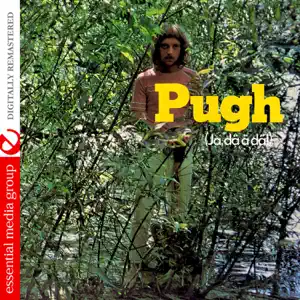


Acerca de Pugh Rogefeldt
Pugh Rogefeldt had a large number of hits in the '70s and for a while he widened Swedish mainstream rock with playful arrangements and by merging many different styles. But maybe Rogefeldt's most important contribution was to break the language barrier for Swedish rock bands. Not only did he use Swedish, but he also used it in a way that hadn't been done before, including the expressiveness and singing techniques of modern rock. Later in the '70s, Rogefeldt turned to more straightforward rock & roll, and in the '80s, his career slowed down considerably as rock & roll started to seem increasingly out of date. A period with Grymlings in the early '90s was very successful commercially, but earned him little musical respect. The very quiet period that followed was ended with the release of a solo album in the late '90s. Rogefeldt remained well-respected for what he had done, but of little contemporary importance.
Pugh Rogefeldt was born as Torbjörn Rogefeldt in Västerås in 1947. As a kid he sang in a boy's choir in the church and later played blues in some hobby bands. With the local R&B band Mercy Sect he started to write lyrics in Swedish, and in 1968, he released the solo single "Haru' Vart' På Circus?" Rogefeldt sent demo cassettes to a number of record companies, but by the time he heard from Metronome, he had started his military service. No leave was granted for recording records, but Rogefeldt left for the studio anyway, something he would later serve three months in prison for. Ja, Dä ä Dä was recorded in 1969 together with the eminent guitarist George Wadenius and drummer Jan Karlsson from Hansson and Karlsson. Karlsson was later to be known as a second-rate actor, but at that time he was one of the most respected funk and jazz drummers in Sweden. Producer was Anders Burman. Ja, dä ä dä was a commercial success and received a Swedish Grammy award for best album. Pughish was released in 1970 and contained the same symbiotic rock as the first album, showing influences from funk, jazz, folk music, and blues-rock, as well as from lightweight, nonsense pop lyrics, stretching as far as to include even elements of children's music. Hollywood was released the following year, now without Karlsson and Wadenius.
Keeping his nose for good collaborators, he recorded Pugh on the Rocks together with Swedish reggae and blues pioneer Peps Persson and guitar virtuoso Janne Schaffer before forming the band Rainrock in 1974 with his brother Ingemar Rogefeldt. The band also included drummer Bo Frölander and bassist Roger Pettersson. The mid-'70s were Rogefeldt's commercially most successful period, and the live album Ett Steg Till, featuring Janne "Lucas" Persson and Ola Magnell, marked the peak. With Rainrock, Rogefeldt developed a harder rock sound and left some of the playfulness of the early albums behind, but already in 1977 he released a new solo album. The country and R&B-influenced Bamalama was partly recorded at Muscle Shoal Sounds in Alabama and featured a great number of different musicians. The next hit for Rogefeldt was not necessarily a good one. With "Nattmara" he took part in the Swedish qualifications for the Eurovision Song Contest. This contest has become known as something of a credibility drain, and though it is hard to say if that happened to Rogefeldt, it was the start of a much less successful period in the '80s.
After disbanding Rainrock, Rogefeldt switched to EMI. He recorded a few unsuccessful albums together with various bands until reuniting with Rainrock and releasing Pugh Rogefeldt in 1986. This album featured a hit single, but the partial success was not followed up by any more albums during the '80s. The next time Rogefeldt was heard was five years later in the group Grymlings, which was built on the same concept as Traveling Wilburys, just did not include stars of the same magnitude. In addition to Rogefeldt, the members were Mikael Rickfors, Magnus Lindegren, and Göran Lagerberg, formerly Tages. Their first self-titled album was a huge commercial success. In 1991, Rogefeldt released a new solo album, Människors Hantverk. In spite of some good reviews, the album failed to sell much, but the next, also self-titled, album by Grymlings made up for this. By Swedish standards, the success of these albums was huge and it allowed Rogefeldt to move out to the countryside and retire from music. But they also hurt his credibility with the critics. This new quiet period lasted for seven years and was ended in 1999 by the release of Marathon. The album received good reviews and Rogefeldt was able to ride some on the wave of country and roots rock in the late '90s. That same year he sang a duet with Petter, the big Swedish rap star, on the album Bananrepubliken. ~ Lars Lovén
Pugh Rogefeldt was born as Torbjörn Rogefeldt in Västerås in 1947. As a kid he sang in a boy's choir in the church and later played blues in some hobby bands. With the local R&B band Mercy Sect he started to write lyrics in Swedish, and in 1968, he released the solo single "Haru' Vart' På Circus?" Rogefeldt sent demo cassettes to a number of record companies, but by the time he heard from Metronome, he had started his military service. No leave was granted for recording records, but Rogefeldt left for the studio anyway, something he would later serve three months in prison for. Ja, Dä ä Dä was recorded in 1969 together with the eminent guitarist George Wadenius and drummer Jan Karlsson from Hansson and Karlsson. Karlsson was later to be known as a second-rate actor, but at that time he was one of the most respected funk and jazz drummers in Sweden. Producer was Anders Burman. Ja, dä ä dä was a commercial success and received a Swedish Grammy award for best album. Pughish was released in 1970 and contained the same symbiotic rock as the first album, showing influences from funk, jazz, folk music, and blues-rock, as well as from lightweight, nonsense pop lyrics, stretching as far as to include even elements of children's music. Hollywood was released the following year, now without Karlsson and Wadenius.
Keeping his nose for good collaborators, he recorded Pugh on the Rocks together with Swedish reggae and blues pioneer Peps Persson and guitar virtuoso Janne Schaffer before forming the band Rainrock in 1974 with his brother Ingemar Rogefeldt. The band also included drummer Bo Frölander and bassist Roger Pettersson. The mid-'70s were Rogefeldt's commercially most successful period, and the live album Ett Steg Till, featuring Janne "Lucas" Persson and Ola Magnell, marked the peak. With Rainrock, Rogefeldt developed a harder rock sound and left some of the playfulness of the early albums behind, but already in 1977 he released a new solo album. The country and R&B-influenced Bamalama was partly recorded at Muscle Shoal Sounds in Alabama and featured a great number of different musicians. The next hit for Rogefeldt was not necessarily a good one. With "Nattmara" he took part in the Swedish qualifications for the Eurovision Song Contest. This contest has become known as something of a credibility drain, and though it is hard to say if that happened to Rogefeldt, it was the start of a much less successful period in the '80s.
After disbanding Rainrock, Rogefeldt switched to EMI. He recorded a few unsuccessful albums together with various bands until reuniting with Rainrock and releasing Pugh Rogefeldt in 1986. This album featured a hit single, but the partial success was not followed up by any more albums during the '80s. The next time Rogefeldt was heard was five years later in the group Grymlings, which was built on the same concept as Traveling Wilburys, just did not include stars of the same magnitude. In addition to Rogefeldt, the members were Mikael Rickfors, Magnus Lindegren, and Göran Lagerberg, formerly Tages. Their first self-titled album was a huge commercial success. In 1991, Rogefeldt released a new solo album, Människors Hantverk. In spite of some good reviews, the album failed to sell much, but the next, also self-titled, album by Grymlings made up for this. By Swedish standards, the success of these albums was huge and it allowed Rogefeldt to move out to the countryside and retire from music. But they also hurt his credibility with the critics. This new quiet period lasted for seven years and was ended in 1999 by the release of Marathon. The album received good reviews and Rogefeldt was able to ride some on the wave of country and roots rock in the late '90s. That same year he sang a duet with Petter, the big Swedish rap star, on the album Bananrepubliken. ~ Lars Lovén
Canciones más vistas de
Pugh Rogefeldt en Abril
Top Artistas
Nosotros
Notas
